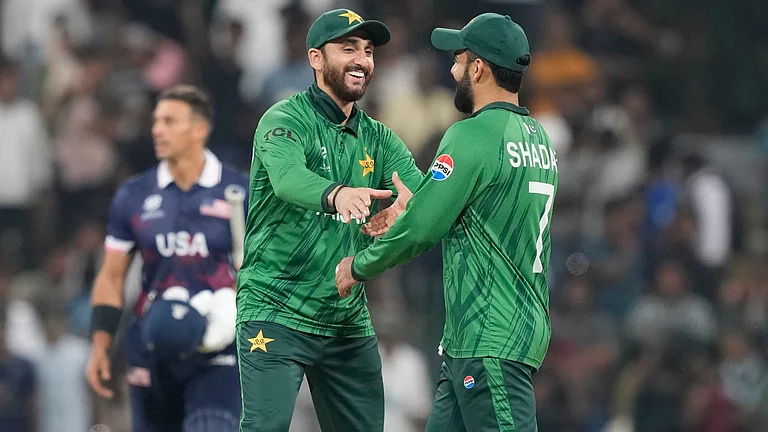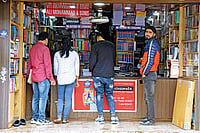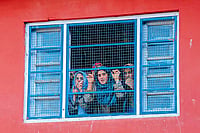The images after the terrifying attack on the CRPF column last week were instructive. Flesh and metal strewn on the road after 40-odd human beings were killed in a single blast, a mangled shell of what used to be a bus and a dark circle of powder marked the spot of the blast. Immediately, a videotape of the 20-year-old suspected bomber Adil Dar began circulating in the Valley. Soon more images followed from the villages and homes of the CRPF personnel. Children lost, weeping as tiny hands clung to adults. Stunned grownups looking on, openly crying as the word ‘martyr’ was sounded by reporters. Then, from Dar’s village, surfaced images of thousands of men, women and children at the funeral of yet another martyr—their own.
These images were followed by reactions of those far away from both mauled Kashmir and broken villages of the now dead. First, of course, came the instant media. So instant that more often than not they were deficit in thought. Mostly breathing fiery words, devoid of any understanding or analysis and, most worryingly, demonising the Kashmiri. All Kashmiris. There were some sober media reactions and some groping analysis in mainland India. The next day, some essays and commentary desperately sought moderation in rejoinder. Others did not.
A startling early media analysis was an inquest that straightway blamed Pakistan, dramatically declaring the bombing a clear act of war by Pakistan, and Islamic religious radicalism in Kashmir as the other reason behind it. That Dar had been recruited by Jaish-e-Mohammed, the Islamist militant group that claimed responsibility for the killings, was proffered as evidence of the religious radicalism part. This instant analysis was stark: Pakistan and Islamic radicalism. Case closed.
Constraints of space and deadlines notwithstanding, such rushed accusations and analyses are an illustration of the downside of our instant-everything world. And the reactions of everyday people in mainland India have been no less startling. Or perhaps not, given the BJP government’s trajectory over the past five years.
In Jammu, there was immediate backlash against Kashmiris who live there, or had moved there for the winter. Within 24 hours, scores of vehicles belonging to Kashmiris were torched. Kashmiri houses were stoned. Loud marches were organised, where anti-Kashmiri slogans resounded in the streets. Thousands of Muslim Kashmiris had to find shelter in mosques and Kashmiri neighbourhoods for safety. Kashmiri state government employees asked the governor to put safety measures in place, or let them return to Kashmir. Reactions of everyday people towards everyday Kashmiris were no different in the rest of India. Tenants were asked to vacate, professionals were sacked, and shops and goods of merchants vandalised.
The everyday politician of this age, followers of mob-rule, were not far behind. Union minister Jitendra Singh of the BJP, who represents J&K’s Udhampur in the Lok Sabha, fuelled local anti-Kashmiri sentiment further by publicly accusing Kashmiri “mainstream” political parties of being “apologetic” in condemning the bombing. Finance Minister Arun Jaitley promised “incontrovertible evidence” of Pakistan’s involvement and pledged “to ensure complete isolation (of Pakistan) from the international community”. Case closed.
There are voices, of course, that urge caution. But in this age of populist authoritarianism, they are simplistically categorised as anti-national and unheard. Lost in all the noise and silenced in its wake is any discourse on how South Asia reached this point and, more critically, what we are to do about it. All that is heard is demonisation of Kashmiris and calls for “crushing” Pakistan.
Statements of some senior BJP politicians serve to add a layer of tolerance of military indiscipline, not unknown in Kashmir. Laws such as the Armed Forces (Special Powers) Act already do this, of course. But the extrajudicial statements of politicians embolden soldiers. The difference between empowering and emboldening is that empowering provides “legal” legitimacy, whereas emboldening, whether civilian mobs and armed soldier, provides “moral” legitimacy. Both need to be rolled back if India is to retain its credibility as a democracy. The faultline between the Modi-Shah-Doval hardline and the Rajnath Singh more-open-to-dialogue approach could be a starting point.
The second “to do” item for the government of India is to have in place a structure for responses to events like Pulwama that ensure sober decision-making rather than personal emotion and off-the-cuff statements. As former foreign secretary Shyam Saran points out, PM Narendra Modi’s “free hand to the armed forces” exposes a lack of understanding of the relationship between the military command and the civilian government in a democracy. This absence in the “world’s largest democracy” is worrisome and explains in part the all-India anti-Kashmiri actions.
At the risk of sounding clichéd, even trite, the importance of initiating a dialogue on the Kashmir conflict is as critical as its absence is dangerous. To say dialogue is different from saying ‘talks’. Dialogue implies not just ‘jaw jaw’, but listening to the rival’s politics—to the ‘other’ in the J&K dispute, who challenge India’s sovereignty and even Delhi’s sibling nemesis, Islamabad. Unless such an understanding of ‘talks’, negotiations or dialogue is integrated into one’s perspective, there will be no resolution, no reconciliation and no peace in South Asia.
Then there is the challenge of the next big event in South Asian politics—the Indian parliamentary elections around the corner. The BJP’s well-known tactic of polarising and then exploiting it for electoral gain has the region on edge. Especially worrisome is the cynical rationale of lip-service to the strategic admission to the international community that “war is not the solution” even while tactically whipping up domestic emotions to win seats. The Indian electorate must know there is such a thing as being too late to retrieve sanity in the games some politicians play!
Are Kashmiris really alienated from India? That is a frequent question asked in parlour conversations on politics. Given the reactions in large swathes of mainland India against Kashmiris last week, the answer should be obvious. Yes. Even then, the outpouring of anger, dislike and loathing against them has startled Kashmir. Is it hate? And will Kashmiris hate back in turn?
One prays not. Quite apart from the passions, hostilities and violence conjured by it, hate corrodes the vessel that vehicles it.
(The writer is a scholar of Central Asian and Tibetan political history and former vice-chancellor of Islamic University of Science and Technology, Kashmir. The views expressed are personal.)























